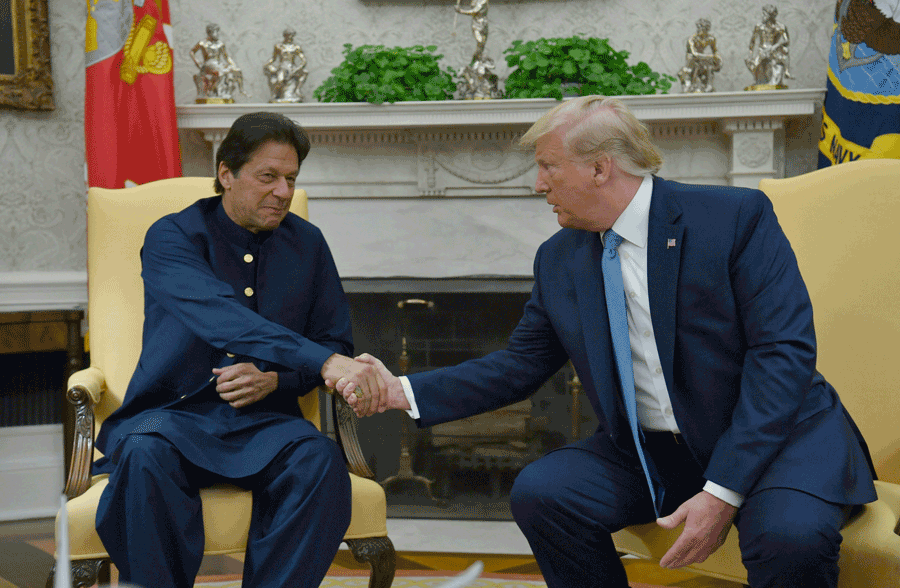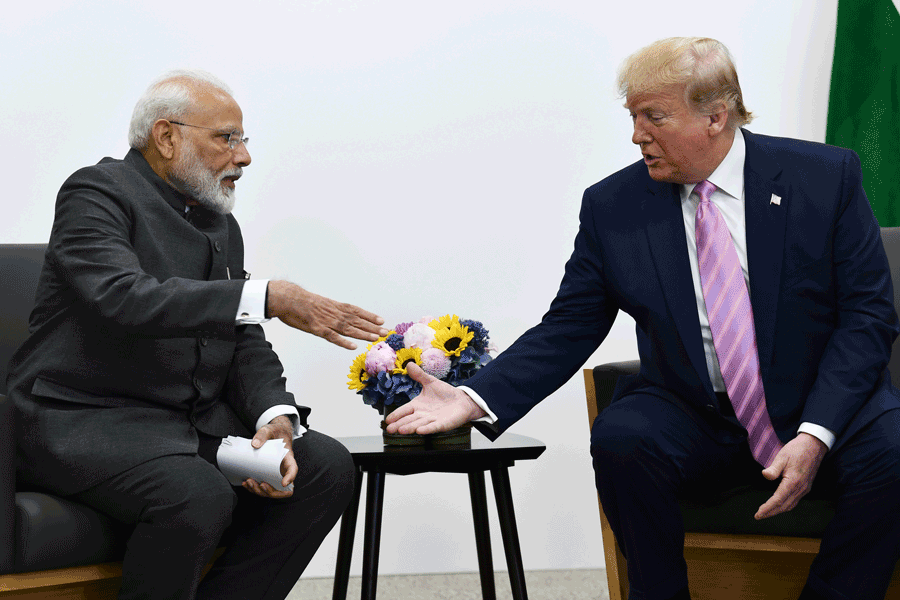A Captain’s Innings
By Ashraf Jehangir Qazi | Cover Story | Published 5 years ago
Prime Minister Imran Khan had a successful visit to the US including a political ‘love-fest’ with the egregious Trump. He articulated the importance of relations with the US, his perceptions regarding Afghanistan, India and Kashmir and his war on corruption. He addressed a mammoth crowd of Pakistani-Americans, had meetings with US business chambers, House Speaker Nancy Pelosi, congressmen, the Pakistan caucus, a major think tank and the US media.
He was less convincing explaining the military’s political dominance, the injustices suffered in Waziristan and Balochistan, media curbs, the harassment of journalists, the state of the economy, the use of accountability as a political weapon and his aversion to criticism. Nevertheless, the fact is, he did inherit the mess of decades of cynical, corrupt and criminal governance, both civilian and military.

Birds of a feather? Khan and Trump at the Oval Office in the White House.
The prime minister seemed self-assured and spoke persuasively. He came across as a mature and informed leader. The presence of his military and intelligence chiefs may have raised questions. However, he insisted the military and he were on the same page on all fundamental issues and policies. He admitted Pakistan had not been honest in the past and 40 militant groups were in Pakistan. President Trump and his administration were, nevertheless, happy to see the civilian and military leadership of Pakistan sharing similar perceptions on Afghanistan and counterterrorism, and committing to help implement American requests.
Neither the White House nor the US State Department statements mentioned Kashmir despite Trump’s ‘bombshell.’ In fact, the State Department is already holding the prime minister’s feet to the fire, referring to his commitments to persuade the Taliban to accept US conditions, eliminate terrorist organisations in Pakistan and secure the release of American hostages.
Preparations for future accusations, which would allay Indian concerns, are apparently underway. Washington think tanks which interface with the US Administration see the Pakistan military and intelligence’s influence over critical domestic and external policies as an irreversible political reality. They also see the prime minister accepting this reality. The military remains the interlocutor.
There are questions about what the prime minister got, or was promised, regarding monies owed to Pakistan, trade and investment, the IMF’s front-loaded conditions, the FATF’s black list threats, and the Aafia Siddiqui exchange, in return for doing what the Americans want him to do. Diplomacy is all about quid pro quo and backbone. Only slaves work for free.
The return of the PM to a rapturous welcome, marks the completion of a year in office. Despite his woeful inheritance, the time has come when the buck stops with him. No longer can he credibly indict his predecessors for any failure to alleviate the plight of the masses.
Many of the PM’s middle class and educated supporters are plunging towards the hell of life around or below the poverty line. Many of his even poorer and more passionate supporters have already been consumed by austerity, inflation and unemployment. He has responsibilities that transcend every constraint on him. The US must factor these responsibilities into its policies towards Pakistan, if it wants his cooperation.

Did he, or didn’t he? Modi and Trump at the G20 Osaka Summit in Japan.
What were the outcomes on Afghanistan and Kashmir? Afghanistan is considered the reason for Trump’s invitation. Not long ago, Trump wanted to exclude Pakistan from an Afghan settlement process. That was the substance of his January 2018 tweet, in which he accused Pakistan of deceit and treachery and invited India to assume responsibility for the region. Now Trump considers Pakistan critical to any stable settlement in Afghanistan. Indian policy-makers and analysts are flabbergasted.
The PM said he will do his best to persuade the Taliban to negotiate with Kabul without demanding a prior pull-out of US fighting forces and, meanwhile, to accept a ceasefire with Kabul. But he rightly admits he does not control the Taliban, although they are directly and indirectly dependent on Pakistan’s goodwill.
The Taliban are unlikely to accept US military intelligence bases, or any kind of US counterterrorism force in Afghanistan. Nor will they accept a conditions-based withdrawal of US troops. They insist on a time-bound withdrawal schedule, before considering a ceasefire with Kabul. They also insist on an interim government in Kabul. They may, however, accept elements of the current regime in such a government. That would spell the end of Ashraf Ghani, who recently visited Pakistan and whose government Pakistan recognises. Kabul responds through the TTP.
The Taliban will not accept the Afghan constitution without amendments and they are not likely to participate in elections they would lose. Instead, they want a guaranteed sharing of power to safeguard their gains on the battlefield. Moreover, given the Taliban experience after 9/11, they do not trust a Pakistan under American pressure, to change their fundamental positions. They fear Pakistan will bring a split between their leaders and commanders. Accordingly, they insist on being the main interlocutor of the US for an Afghanistan settlement.
The PM will meet the Taliban shortly. He respects their tenacity. But he cannot credibly or even decently view them as the future of Afghanistan. The Afghans have long accused Pakistan of wanting to impose a ‘friendly’ government on them that it would never countenance for itself. This has helped India. Gaining the trust of both Kabul and the Taliban will be a major undertaking.
The Kabul government has its own responsibilities to live up to. It can be persuaded to do so through sensible and generous policies rather than being treated as an irrelevant loser. Pakistan needs to restructure its Afghanistan policy under the leadership of the PM, backed by a credible parliament and an informed public opinion. He will need to consult all ‘stakeholders.’ But he cannot have others deciding his policies. Afghans are not easily browbeaten. The Taliban survive between life and death every day and can judge character instantly.
Trump, however, is in a hurry. He needs results by September. This is impossible, given the Taliban’s rejection of elections. If by the end of the year, Pakistan ‘fails’ to deliver a US-Taliban agreement on US terms, it could upset Trump’s electoral plans. India is anticipating this. Meanwhile, Taliban suspicions grow.
On Kashmir, the magical moment was when Trump told the PM that Modi suggested he mediate or arbitrate a Kashmir settlement. He had met Modi “around two weeks ago,” which meant the Osaka G-20 meeting. India denied Trump’s statement. In September, Modi will meet him. Will Trump walk away from his Kashmir statement? China’s endorsement of Trump’s offer will make India even more desperate to change his mind. In truth, any US mediation or arbitration would aim at a territorial status quo-based settlement. Pakistan needs to be sure of what it wants, and tell it to the people.
Nevertheless, the fact that Trump raised the issue of mediation reflects the reality that India is up the creek in Kashmir. It cannot reconcile the new generation of Kashmiri resistance. Nor can it pursue ‘a final solution,’ as advocated by the Rashtriya Swayamsevak Sangh (RSS) Nazis, without compelling Pakistan to respond. Moreover, both India and Pakistan are nuclear armed countries, without nuclear doctrines to assure the world they can contain a serious military escalation.
Given Trump’s statement about Modi’s request, India’s frustrations in Indian-held Kashmir (IHK) and its need to ‘correct’ the diplomatic situation after Khan’s visit, there is a danger of a false-flag operation in IHK. This would be aimed at undermining his credibility. Khan made a lasting impression on the US leadership, which is precisely why India may feel it essential to ‘demonstrate’ that he cannot be relied upon, as he has no control over his maverick military and intelligence establishment, or ‘extremist’ networks that operate from Pakistan-controlled territory.
The US must pressure India in order not to betray Pakistan. For this reason alone, Pakistan must maintain the link between progress towards an acceptable Kashmir settlement and a stable Afghanistan settlement. Pakistan has leverage, provided that its foreign policy is not hijacked. The US is stuck in Afghanistan. India is stuck in Kashmir. Isolate Pakistan, and they will remain stuck!
The larger strategic context is the New Great Game in Asia, between the US, Japan and India on the one hand, and China, Russia, Iran and, yes, Pakistan on the other. The US, as the sole global ‘hyper-power’, is of critical importance for Pakistan. Its hostility and pressures must be minimised. It is, however, India’s strategic partner. Pakistan’s strategic partner is the globally-emerging China. For Pakistan to pander to the US at the risk of betraying CPEC and undermining Chinese strategic confidence, would be criminally stupid. It would expose Pakistan as a soft state that did not know or care about its own survival interests.
Ashraf Jehangir Qazi has served as Pakistan’s Ambassador to the US, India and China and as the head of UN missions in Iraq and Sudan.


